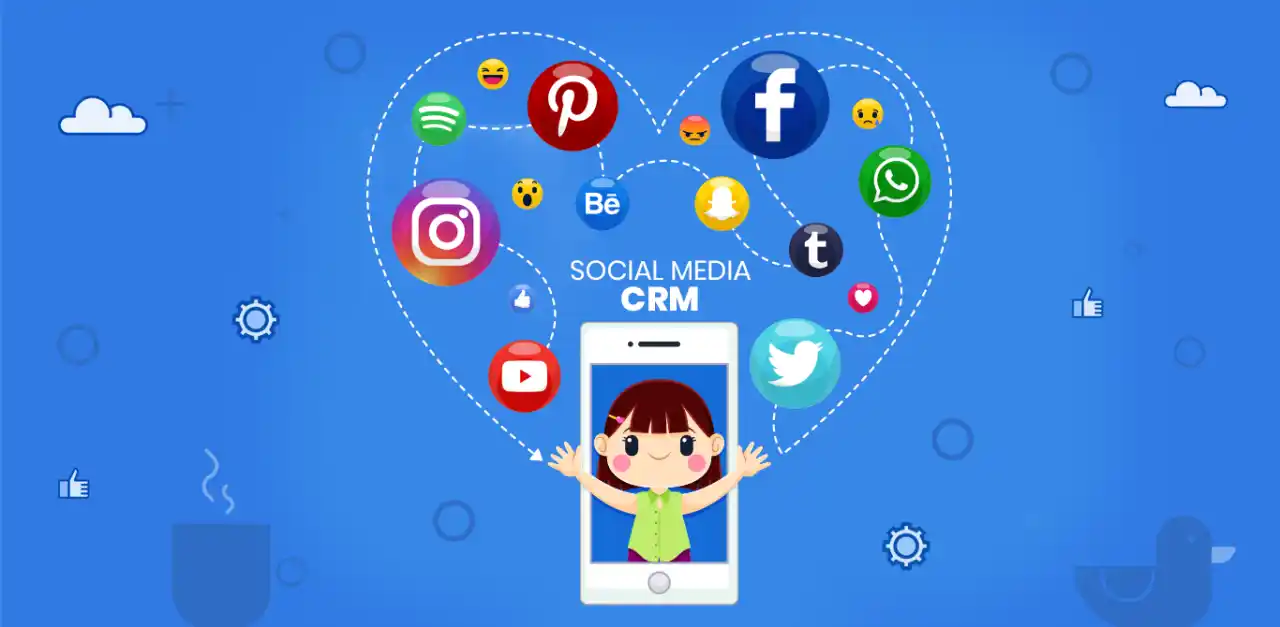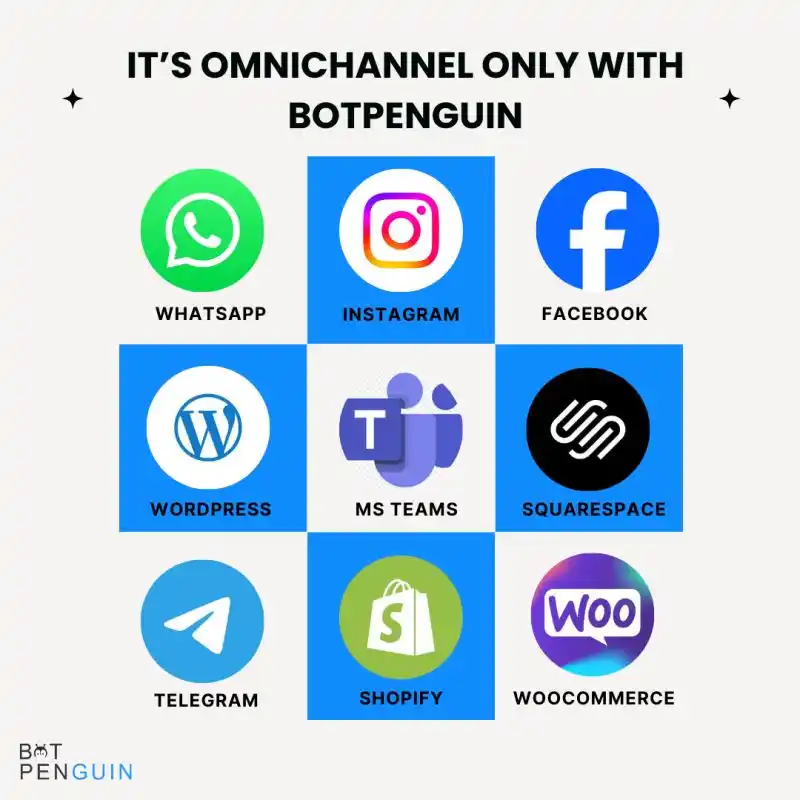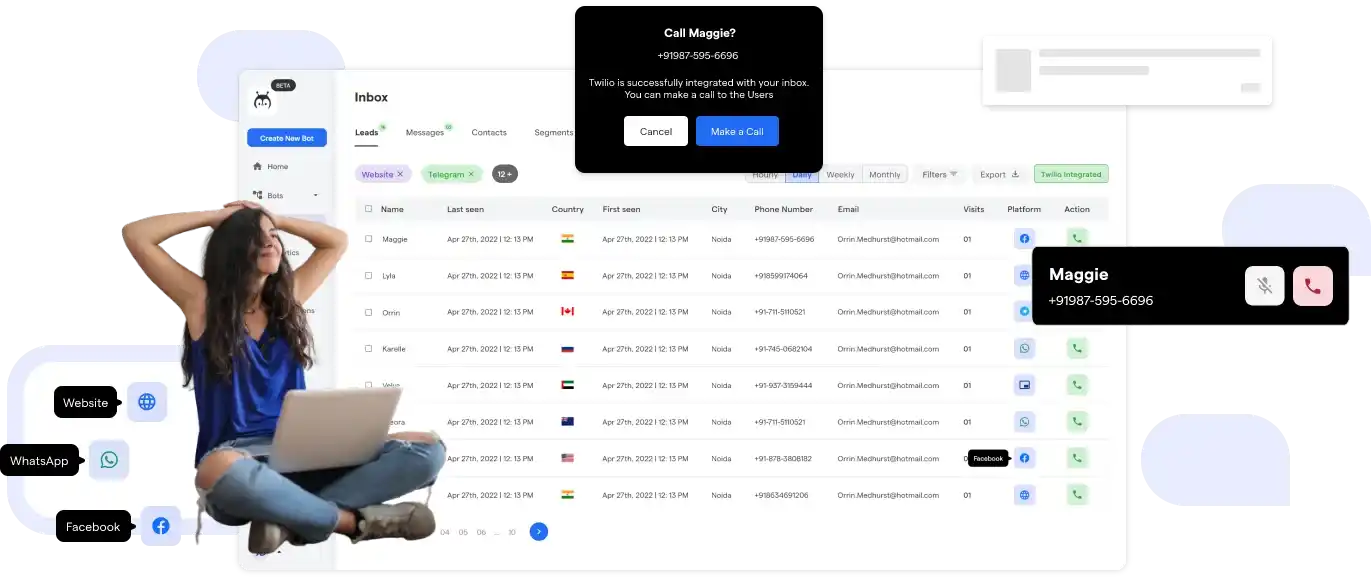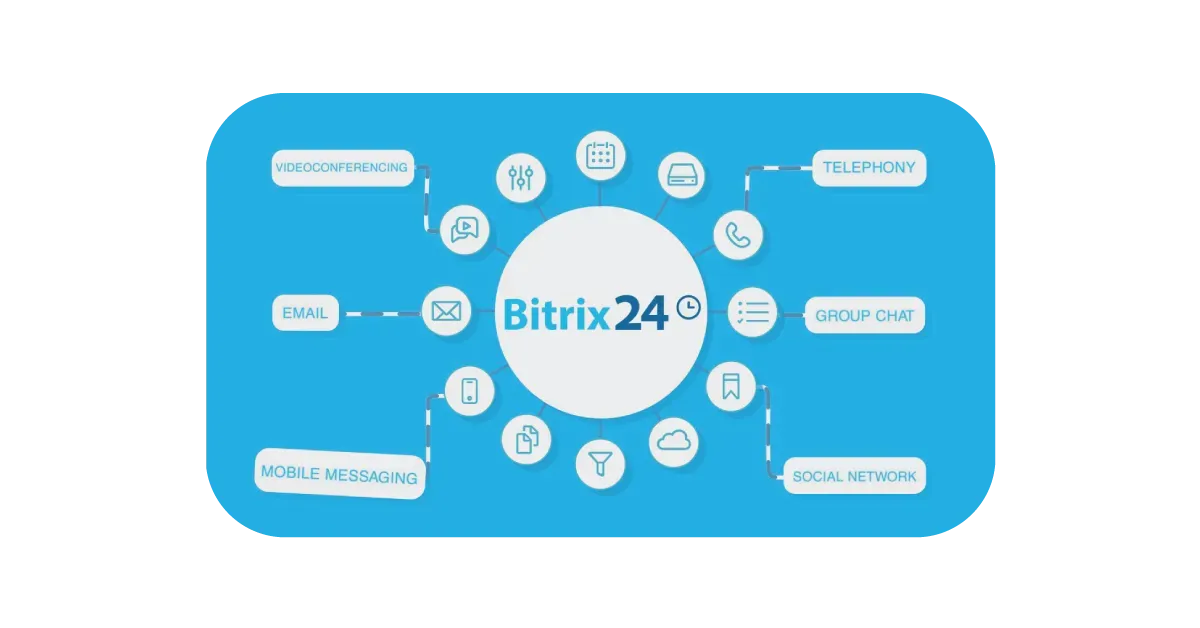Introduction
Seamlessly integrating social media with CRM systems offers invaluable benefits for brands looking to boost customer engagement. Recent data underscores how crucial an omnichannel presence is for success. According to Salesforce, an integrated CRM system combining email, social media, telephone and other channels can achieve 91% greater leads-to-close rate than individual channels alone.
Meanwhile, Forrester found that 77% of US online adults use social media regularly while eMarketer reported that worldwide social network users now total over 4.65 billion. Tapping into platforms like Facebook, Instagram and Twitter to understand interests and behavior represents massive potential for lead generation and conversions.
However, fragmented tools and workflows often obstruct meaningful omni-channel experiences. Integrating social media engagement directly with CRM software centralizes all interactions for more informed outreach. Smooth data flows between platforms ensures contextual messaging and follow-ups for sales. It also helps agents resolve customer issues faster with complete history visibility from initial outreach to post-purchase support.
As the dominance of social media continues rising, integration with CRM emerges as an essential ingredient for maximizing consumer lifetime value in the digital age through coordinated experiences.
What is CRM Integration with Social Media Platforms?

For brands today, integrating social media presence into customer relationship management (CRM) strategies has become utterly vital for growth. When done well, linking popular platforms like Facebook and Instagram directly with CRM systems creates a valuable two-way data flow.
On one hand, social media provides a wealth of behavioral insights and interaction opportunities with both potential and existing customers. Things like interests, attitudes, satisfaction levels and influence are all discernible from profiles and public conversations if leveraged properly.
In the other direction, CRM-derived data on lead scores, deal stages and support tickets can inform more relevant social media messaging at scale. Content and outreach can be personalized based on CRM analytics.
This synchronized, omnichannel approach allows brands to tap into social's potential more intelligently. Customer-centric experiences get backed by data trails so that marketing and service never happen in silos. Unified profiles also ensure conversations pick up right where they left off as consumers jump between channels.
In short, fused CRM and social media systems mean crafting journeys tailored to people, not platforms. The benefits for retention and advocacy are immense when outreach meets individuals contextually at every touchpoint.
So continue reading to know the benefits of CRM integration with social media platforms.
The Benefits of CRM Integration with Social Media Platforms
Consumers expect seamless, personalized brand interactions across all channels and touchpoints. Yet many companies still struggle to connect consumer data and messaging across platforms, leading to fragmented experiences.
This is where integrating social media platforms with customer relationship management (CRM) systems can prove transformational. There are many benefits to it, like:
Enhanced Consumer Insights
One of the benefits of CRM integration showcases consumer interests, attitudes, satisfaction levels and influence abilities based on social profiles and public exchanges. These valuable behavioral insights help marketing and service teams better understand target audiences for sharper personalization.
Improved Lead Generation
Another benefit of CRM integration is improved lead generation. Syncing platforms means prospects engaging with your social media content can be tracked into the sales funnel. CRM records every conversion event like downloads, site visits and form fills for assessing lead potential based on online behavior across channels. Sales can follow-up contextually.
More Relevant Messaging
More relevant messaging is another important benefit of CRM Integration. Consumer data from CRM tools that can inform highly tailored social media content and conversation. For example, AI bots can be trained to have personalized dialogues and promotions based on integrated purchase history or support ticket data. Customers feel understood.
Omnichannel Journey Streamlining

A unified profile pulling data from both social and CRM platforms follows the customer seamlessly across touchpoints. A support conversation on Twitter can pick right up via email. Or an abandoned cart reminder deploys via Facebook Messenger instead of seeming random.
Enhanced Support Capabilities
When customer service teams access integrated profiles, full visibility on previous issues and resolutions guides better assistance. Consumers don't have to repeat details across channels for a smooth experience. There are many other benefits of CRM integration.
Top Platform CRM Integration Partnerships

While manual CRM integrations are possible for motivated teams, specialized integration platforms speed up and simplify the process considerably. Partnerships between top social media platforms and CRM/marketing providers have emerged to address enterprise needs.
For example, Salesforce offers Social Studio to sync data flows from social properties into its Sales and Service Cloud platforms. Adobe ties social campaigns into analytics dashboards. HubSpot centralizes Facebook and Instagram APIs into its all-in-one suite. Social media management platform Hootsuite now integrates directly with leading CRM solutions.
And forward-thinking new tools like BotPenguin enable intuitive creation of AI-powered chatbots on Instagram and Facebook for unified engagement. These bots integrate directly with the business CRM dashboard to sync conversations, profiles and analytics across channels.
The consumer shift towards digital has only accelerated recently. Brands realizing the full benefits of integrated social and CRM ecosystems will gain sustainable competitive advantage in coming years by unifying data for highly tailored experiences. Avoid disjointed tools and start centralizing today.
Best Practices for CRM Integration with Social Media Platforms
Successful CRM integration with social media platforms requires careful planning and implementation. To ensure a seamless integration and maximize its benefits, businesses should follow best practices, like:
Selecting the Right Social Media Platforms for CRM integration
The first step in achieving successful CRM integration with social media platforms is selecting the right CRM and social media platforms for your business. It is important to choose CRM software that aligns with your specific business needs and goals.
Consider factors such as scalability, customization options, and integration capabilities. Look for a CRM system that offers seamless integration with popular social media platforms such as Facebook, Twitter, LinkedIn, Instagram, and others.
Similarly, analyze your social media requirements and select platforms that best suit your business objectives. Each social media platform has its own unique features, audience demographics, and advertising options. Take into account your target audience, the type of content you plan to share, and the level of engagement you want to achieve.
By carefully evaluating and selecting the right CRM and social media platforms, you can lay a solid foundation for a successful integration.
Effective CRM Integration and Social Media Tools
Once you have selected the appropriate CRM and social media platforms, the next step is to integrate them effectively. This involves setting up the necessary connections and automations to synchronize data between the CRM system and social media platforms.
Leverage the CRM integration capabilities and social media platforms to establish real-time data synchronization. Automate processes such as lead capture, campaign tracking, customer interactions, and social media analytics. This seamless integration ensures that data flows smoothly between platforms, minimizing manual data entry and reducing the risk of errors.
By integrating CRM and social media tools effectively, businesses can harness the full power of both platforms and enhance the overall customer experience.
By integrating a CRM with your chatbot you can set up drip campaigns and send bulk messages on platforms that are convenient for your customers. Because BotPenguin provides no code AI chatbots for multiple platforms like:
- WhatsApp Chatbot
- Facebook Chatbot
- Wordpress Chatbot
- Telegram Chatbot
- Website Chatbot
- Squarespace Chatbot
- Woocommerce Chatbot
- Instagram Chatbot
Training Employees and Ensuring Adoption
Lastly, training employees and ensuring adoption is crucial for the success of CRM integration with social media platforms. Offer hands-on training sessions, tutorials, and ongoing support to address any questions or challenges.
Encourage employees to actively use the integrated system and social media platforms in their daily interactions with customers. Foster a culture of collaboration and knowledge sharing to maximize the benefits of the integration.
Regularly assess employee adoption and provide feedback, recognition, or incentives to motivate them to utilize the integrated tools. By ensuring employee buy-in and adoption, businesses can make the most out of their CRM integration with social media platforms.
Challenges and Solutions for CRM Integration with Social Media Platforms
In this section, we will explore some of the common challenges that businesses face during CRM integration with social media platforms and innovative solutions to address them.
Challenge 1: Data Privacy and Security

One of the biggest challenges in CRM integration with social media platforms is ensuring data privacy and security. Social media platforms collect vast amounts of customer data, which, if not properly secured, can be vulnerable to cyberattacks and data breaches.
This can result in leaking confidential customer information, causing reputational damage to the business. Moreover, each social media platform has its own privacy policies, which can differ significantly from one another.
Solution: Implement Robust Security measures
To address this challenge, businesses should implement robust security measures. Businesses should establish strict privacy policies that meet compliance requirements and ensure that customer data is stored securely. They should make sure they follow the privacy and data protection policies of each social media platform they use.
A secure SSO or token-based authentication mechanism can be implemented to ensure that the user authentication is persistent and secure.
Challenge 2: Managing Large Volumes of Data
Another challenge in CRM integration with social media platforms is managing large volumes of data. Social media data is massive, constantly evolving, and coming from various sources. Integrating large volumes of social media data with a CRM system can be daunting and overwhelming.
Moreover, managing data quality, standardizing fields, and keeping track of real-time data updates can be a formidable task.
Solution: Use Data Integration Platforms
One solution to this challenge is to use data integration platforms. Integration platforms like Mulesoft, Zapier, or Boomi can automate the integration process, connect the CRM system with multiple social media platforms and consolidate data.
Suggested Reading:
How to Choose the Right CRM Software for Small Businesses?
Challenge 3: Employee Training and User Adoption
The third challenge when integrating a CRM system with social media platforms is employee training and user adoption. Employees need to be trained to adopt new working processes and appropriate use of social media.
Without proper training, they may not be able to use the integrated solution effectively and fail to reap the benefits. Also, ensuring that employees use the integrated system consistently can be a challenge.
Solution: Use Gamification techniques for user adoption
One solution is to use Gamification techniques. Gamification is the process of applying gaming principles to non-gaming tasks. Organizations can incentivize the habit of using the integrated system by assigning rewards, monitoring the users' performance, and publishing leaderboards.
It can inject a sense of competition, make the system more engaging, and motivate employees to use the integrated system consistently.
How BotPenguin's CRM-integrated Omnichannel Chatbot can Elevate your Social Media Strategy?
Businesses are increasingly utilizing chatbots, like BotPenguin, to enhance their social media strategies. BotPenguin's CRM-integrated Omnichannel Chatbot is a powerful tool that can significantly elevate your social media strategy. Here's how:
- Efficient Customer Engagement: BotPenguin's chatbot handles multiple conversations simultaneously, providing personalized responses and resolving customer queries in real-time. This ensures prompt customer service and enhances satisfaction.
- Lead Generation and Qualification: The chatbot captures and qualifies leads directly from social media interactions by integrating with your CRM system. It collects customer information, assesses their needs, and routes qualified leads to sales representatives for nurturing.
- Personalized Marketing Campaigns: By integrating with the CRM system, businesses can deliver targeted marketing campaigns on social media platforms. The chatbot analyzes customer data to tailor messages based on preferences and interests, resulting in higher conversion rates.
- Seamless Data Synchronization: BotPenguin's CRM-integrated chatbot ensures automatic recording and updating of customer interactions, preferences, and lead information in your CRM system. This enables better insights, improved analytics, and informed decision-making.
- Enhanced Customer Experience: The chatbot assists customers with relevant information, purchases, and issue resolution within the social media environment. This convenience and support contribute to a positive customer experience, fostering loyalty.
- Streamlined Social Media Management: Integrating the chatbot with your CRM system streamlines social media management by scheduling and publishing content, tracking engagement metrics, and analyzing customer sentiment. This simplifies workflows and optimizes strategies.
Conclusion
As emerging data and industry trends demonstrate, bridging social media to CRM platforms has become imperative. It streamlining outreach while personalizing consumer journeys in a digital-first world. Integrated systems not only drive more conversions through contextual omnichannel messaging but also long-term brand loyalty thanks to coordinated support.
However, manual data transfers between disparate tools is inefficient. Teams need specialized integration enabling synchronized insights for the over 4.65 billion social media users worldwide, from initial response to post-sale care. Automated customer profiles that update engagement across touchpoints makes relevant messaging and issue resolution possible.
Tools like BotPenguin seamlessly bridge crucial gaps through intuitive social media integrations with popular CRM software. Setting up cross-channel data flows is quick and simple for instant visibility. Tailored BotPenguin bots engage audiences on social media platforms like Instagram and Facebook. It also manages interactions, profile enrichment and bot training in the integrated CRM dashboard.
With innovations reducing enterprise friction points, the customer experience potential of converging social media and CRM continues to grow each year. Harness it now before competitors for measurable gains.
Suggested Reading:
Automaton your sales completely with NetHunt CRM Integration
Frequently Asked Questions (FAQs)
What are the benefits of CRM integration?
Social media CRM offers insights into customer behavior, improves customer service, enables targeted marketing, enhances brand perception, facilitates lead generation, and fosters stronger customer relationships through personalized interactions.
How does CRM integrate with social media?
CRM integration involves capturing social media interactions, analyzing customer data from platforms, automating responses, segmenting audiences, and aligning social insights with CRM databases for a unified view.
How are CRM needs of companies changing with social media?
Social media necessitates real-time engagement, personalized interactions, data analysis for sentiment tracking, and the integration of social metrics into CRM strategies, shifting CRM needs towards more dynamic, customer-centric approaches.
How do you ensure a successful social CRM strategy?
A successful strategy involves defining clear goals, selecting the right CRM tools, training staff, integrating systems seamlessly, actively engaging with customers, monitoring analytics, and continually adapting strategies based on insights for improved customer relationships.


